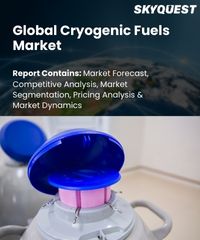
Report ID: SQMIG10E2005

Report ID:
SQMIG10E2005 |
Region:
Global |
Published Date: July, 2024
Pages:
242
|
Tables:
65 |
Figures:
75
The Global Cryogenic Fuels Market is a highly competitive industry, with several major players vying for market share. The global cryogenic fuels market is dominated by a few major players, but there are also several smaller players and emerging startups that are seeking to enter the market with innovative products and services. As the demand for clean energy sources and advanced cryogenic technologies continues to grow, the competition in the global cryogenic fuels market is expected to remain intense.
Cryogenic Fuels Market Top Player’s Company Profiles
Cryogenic Fuels Market
Our industry expert will work with you to provide you with customized data in a short amount of time.
REQUEST FREE CUSTOMIZATIONWant to customize this report? This report can be personalized according to your needs. Our analysts and industry experts will work directly with you to understand your requirements and provide you with customized data in a short amount of time. We offer $1000 worth of FREE customization at the time of purchase.

Report ID: SQMIG10E2005